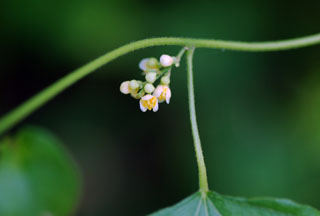CAROLINA MOONSEED
|
 |
| File Size: 70 KB |
|
|
|
Cocculus carolinus (L. ) DC.
|
| Cherokee County, Kansas |
| Height: Vines, to 13 feet |
| Family: Menispermaceae - Moonseed Family |
| Flowering Period: May, June |
|
| Also Called: | | Carolina coralbead, snailseed. | | Trunks: | | Stems climbing or clambering; branches unarmed, without tendrils. Bark grayish green to grayish brown, warty, fissured; wood white, soft. | | Twigs: | | Grayish green to grayish brown, flexible, finely ridged, glabrate or finely woolly; leaf scars half-round to depressed elliptic; buds concealed by dense tomentum. | | Leaves: | | Deciduous, alternate, simple; stipules absent; petiole attached at base of blade, .8 to 2.4 inches, finely woolly; blade ovate to triangular or hastate, 2.4 to 4 inches long, 1.8 to 3.4 inches wide, base truncate to cordate, margins entire or shallowly 3-lobed, lobes narrowly to broadly triangular, apex obtuse to acuminate, surfaces abaxially light green, sparsely to densely finely woolly, adaxially green, glabrous or sparsely finely woolly. | | Flowers: | | Dioecious. Inflorescences axillary or terminal on new growth, racemes or racemose panicles, (3-)10-40-flowered, lax, .8 to 9 inches; peduncles .12 to .6 inch; pedicels .12 to .24 inch, glabrous. Flowers unisexual, +/- radially symmetric; sepals 6-9, distinct, lobes white, ovate to elliptic or obovate, .01 to .1 inch, spreading to ascending; petals 6, distinct, yellow, elliptic to triangular, rhombic, or obovate, .02 to .08 inch, spreading to ascending; staminate: stamens (5-)6, to .09 inch; pistillate: staminodes 6; pistils 6, ovary superior, 1-locular; style 1 per pistil, stigma cylindric. | | Fruit: | | September-October; drupes, red, globose, .16 to .3 inch diam., smooth, glabrous, shiny; stone 1, white, snail-shaped, .2 to .24 inch diam., rim warty, sides concave. | | Habitat: | | Floodplain and upland forests, stream banks, thickets, fencerows, shrubby hillsides. | | Distribution: | | Southeast quarter of Kansas | | Origin: | | Native | | Comments: | | The distinctive snail-shaped stones of Cocculus carolinus somewhat resemble those of Menispermum canadense, but Cocculus stones lack the prominently ridged rim found on Menispermum stones. |
|
| Carolina moonseed leaves |  | | 101 KB | | Cherokee County, Kansas |
| | Carolina moonseed |  | | 65 KB | | Cherokee County, Kansas |
| | Carolina moonseed fruit |  | | 118 KB | | Craig Freeman photo |
| | Carolina moonseed habit |  | | 161 KB | | Craig Freeman photo |
| | Carolina moonseed fruit |  | | 127 KB | | Craig Freeman photo |
|
|
|
|







